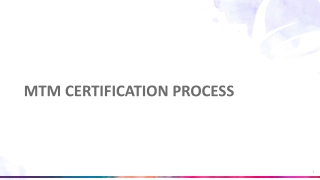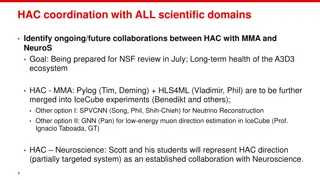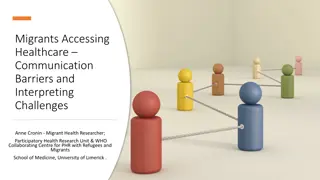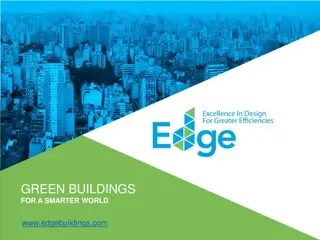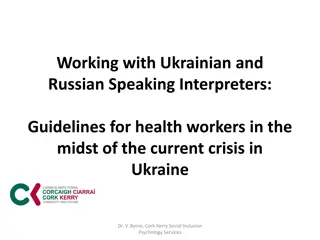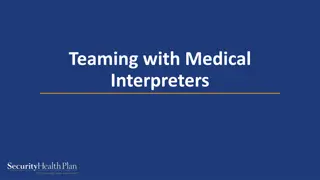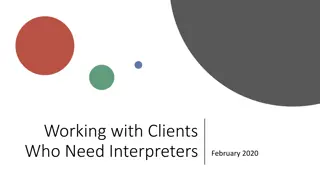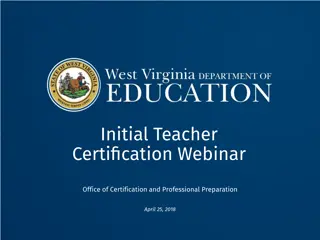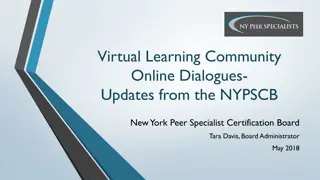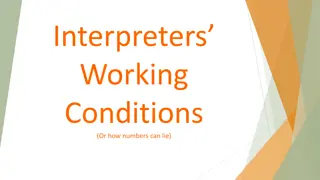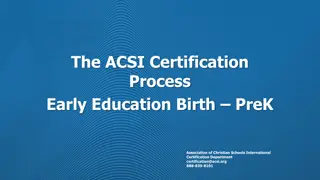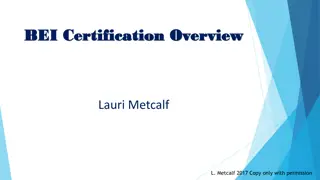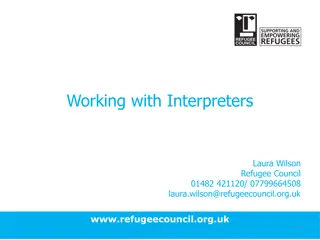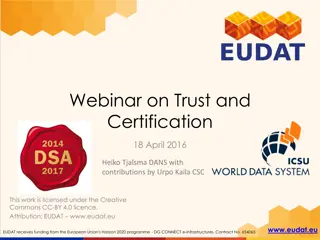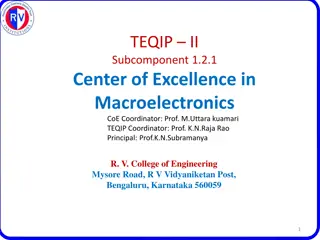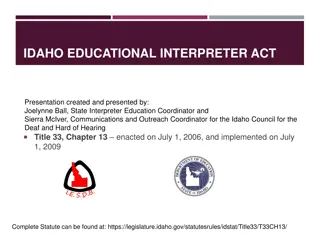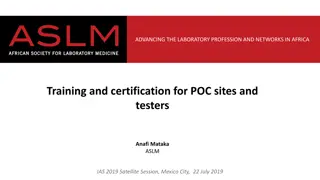Enhancing Interpreters Certification: ICRC Initiatives and Collaborations
ICRC is actively involved in the development and enhancement of interpreter certification processes through various training programs, workshops, and collaborations with different organizations. The organization has developed the Qualified Applied Skills Test (QAST) system and is exploring ways to improve the testing system. Additionally, ICRC is partnering with educational institutions and interpreter training programs to provide guidance and support for aspiring interpreters. The organization's dedication to advancing the certification and training of interpreters is evident through its diverse initiatives and engagements with stakeholders in the field.
Uploaded on Oct 08, 2024 | 0 Views
Download Presentation

Please find below an Image/Link to download the presentation.
The content on the website is provided AS IS for your information and personal use only. It may not be sold, licensed, or shared on other websites without obtaining consent from the author.If you encounter any issues during the download, it is possible that the publisher has removed the file from their server.
You are allowed to download the files provided on this website for personal or commercial use, subject to the condition that they are used lawfully. All files are the property of their respective owners.
The content on the website is provided AS IS for your information and personal use only. It may not be sold, licensed, or shared on other websites without obtaining consent from the author.
E N D
Presentation Transcript
ICRC Stakeholders survey follow-up Survey opened from May 12th- June 12th, 2023 Results - August 2023
Training QAST: ICRC developed a monthly QAST 411 training. The zoom training is for individuals who are considering or ready to take the performance test. The training provides an in-depth discussion on the expectations of QAST, the interview categories, ethical situations, the scoring perimeters. Discussion also focuses on how the percentage of the receptive and expressive scores regulates the certification level and other topics as needed. Plans to implement a MOCK into the QAST 411 training is being considered. There is a QAST General Information document, with study guide, that can be reviewed and downloaded from the ICRC webpage, www.okdrs.gov/ICRC Educational (K-12) related workshops: The QAST system was developed for community interpreting and does not focus on the skill-based assessment in the K-12 setting. The Oklahoma School for the Deaf (OSD) tends to host an annual training for educational interpreters through the Oklahoma Educational Interpreter Training Institute- OEITI. OSD also provides workshops that are funded by the State Department of Education that are educationally focused and at no cost to the interpreters. ICRC has been involved with OEITI and other educational entities about QAST and the requirements. Interpreter Training Programs: It is the sole responsibility of the Interpreter Training Programs to govern the courses they offer and to determine who is eligible to teach the courses in the field of interpreting. ICRC has partnered with the ITPs to conduct presentations about QAST and the requirements. ICRC has developed a practicum student internship to assist the ITP students in observing certified interpreters that will assist in gaining knowledge and witness expertise in the interpreting field.
Workshops ICRC is willing and committed to partnering with other entities/organizations in hosting various types of workshops that were listed on the survey. Some organizations that provides workshops/conferences: OKRID - Oklahoma Registry of Interpreters for the Deaf OAD - Oklahoma Association for the Deaf OSD - Oklahoma School for the Deaf - OEITI RID - Registry of Interpreters for the Deaf NAD - National Association for the Deaf SERID Southeast Regional Institute on Deafness Street Leverage Some entities that provides workshops/webinars CEUs on the Go CATIE Center (Mental Health and Medical workshops) Oklahoma Certified Courtroom Interpreters training(legal training) S.I.G.N Academy (Virtual training, CEUs, and Mentoring) EIPA Boystown (training and workshops) ASLIS (CEUs and Mentoring) Others
Interpreters Certification Testing System QAST- DRS/ICRC is in the process of securing a contract with the University of Arizona, National Center for Interpretation Testing, to analyze the current testing system to provide feedback on where to strengthen, update, and/or implement scoring measurements to maybe integrate into a one level system. This project could take a year or more to complete due to the process of securing contracts, allotting time for analysis, and implementing the results. Until this project is completed, ICRC will continue to utilize the current testing system. BEI ICRC conducted in-depth research on leasing BEI. The research included direct discussion with the state of Missouri, and the state of Wisconsin, and the director of BEI. Information gathered regarding leasing, requirements, expectations, experiences, and general pros and cons on leasing BEI. Conclusion The ICRC staff and SDHH Program Manager had several meetings with the DRS upper management and finance department. Due to the infrastructure impact on the testing process and certified interpreters, and the survey results, it was concluded that DRS/ICRC would not lease BEI. Below are some factors that were considered in these discussions: Evaluations must be sent to Texas to be rated for a year or longer Approximately 6 months for results Annual cost to lease BEI Cost of 4 raters per evaluation, plus extra cost of materials needed for each evaluation Raters must be BEI certified to qualify to be a rater limited BEI certified in Oklahoma Cost for raters training Would need to increase the evaluation fee sufficiently to off-set the cost to lease and pay raters Would impact 80 ICRC interpreters by not grandfathering them into the policy certification Only grandfather 63 V/V into policy DRS/ICRC is contracting with University of Arizona to analyze current testing system.
Policies: There are many phases to a proposed policy change. Generally, changes to a policy can take a year. A unit, such as ICRC, can submit a proposed change to a policy. The ICRC Advisory Committee members, Program Manager, and Field Coordinator are involved in the proposed policy change. Proposed policy changes goes to the Department of Rehabilitation Services Policy Committee, who oversees all policies. DRS Policy Committee members will review proposed policy to see if more information or justification is needed before the policy will be accepted or declined. The accepted proposed policy will be submitted to the DRS Commissioners for review; either accept as is, decline, or make additional changes before accepted or declined. The accepted proposed policy changes, by the Commissioners, goes to a public hearing. After the public hearing, the proposed policy goes back to the DRS Commissioners for approval or denial Approved policy, by the Commissioners, is submitted to the Governor for approval or denial. The Governor is the final phase. Instructions to Staff: There are several phases to Instructions to Staff changes. Changes can become effective within a few weeks. A unit, such as ICRC, can submit a proposed change to the Instructions to Staff. The ICRC Advisory Committee members are involved in the proposed change. Proposed change is reviewed by the DRS Field Coordinator and ICRC Program Manager for approval or denial. All recommended changes must be justified and supported with information. Approved change is submitted to the DRS Support Administration Department for review and approval.
Policy 612:10-13-15 Certification Levels: Interpreter certification levels are set by the Department (DRS). Each certification level should adhere to established guidelines or laws that instruct, restrict or prohibit interpreting in specified settings/environments. Instructions to Staff: Each certification level requires an interpreter to be attentive to accepting assignments based on contingent factors and the preferred communication mode of the consumers. Each level is required to support and adhere to the NAD-RID Code of Professional Conduct relating to the Professional Development, by fostering and maintaining competence through ongoing development of knowledge and skills. In best practice, it is required for interpreters to engage in professional development and demonstrate an extensive knowledge of expanded vocabulary and specialized set of skills when accepting assignments for specific settings such as medical, mental health, education, and legal. QAST skill levels: Below is a chart showing the percentage of accuracy for each certification skill level. There is one exam for Levels I-III and a more advance exam for Levels IV-V. The two-level certification numbers signify the combined Expressive (signing) and Receptive (voicing) for interactive Interpreting and interactive Transliterating. Level I/I 50-69% Level Level II/II 70-84% Level Level III/III 85-100% IV/IV V/V 80-89% 90-100%
Scan the QR code to review the Stakeholders Survey results. Again, thank you to the individuals that participated in the survey. If anyone has questions, suggestions, and concerns, please do not hesitate to contact the staff at ICRC. LV Berglund, ICRC Program Specialist 405-213-5203 Lberglund@okdrs.gov Keri Nutt 405-246-0520 VP knutt@okdrs.gov


